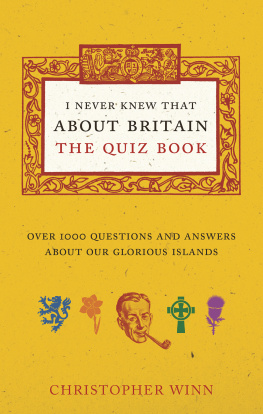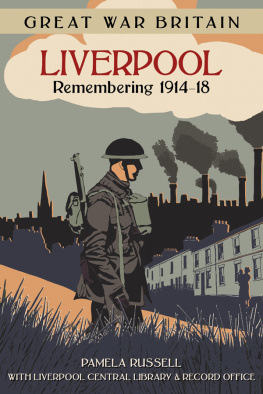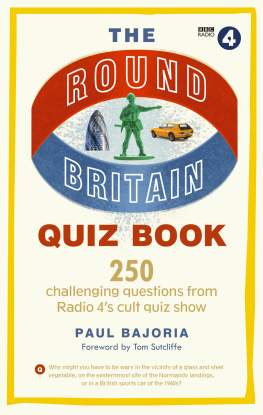At roughly the half-way point in any Brain of Britain contest, the contestants combine to answer listeners questions designed to Beat The Brains. On the face of it, thats the only moment when Brain becomes a team game. But behind the scenes, things are entirely different. The team headed by the producer, Paul Bajoria, invariably includes his Assistant Producer, Stephen Garner, who, in between producing duties of his own, acts as my scorer, paper-shuffler, issuer of alerts (Last Round!) and manager of the complex cue-light system. Steve also leads the audience in applause and generally communicates with the multitude while my head is in the list of questions -- more about those below, from Paul himself. Back at the office, we all owe the fact that we have scripts to read from, and contestants on hand to wrestle with them, to the organising talents of the invaluable Lizzie Foster. And all of us are grateful, season by season, for the support and encouragement of two senior editorial figures at BBC Salford, Nicola Swords and Ian Bent.
In the compilation of the programmes history, and the story of John P. Wynn, its inventor, I relied as I knew Id be able to on my favourite BBC resource, the corporations Written Archive at Caversham. Apart from being the last outpost of the calm and gentility once widespread in the BBC, the Archive is full of surprises, always generously unveiled by Jeff Walden, the veteran Archives Researcher and presiding spirit. If files need to be called in from distant and semi-forgotten sub-archives far from Caversham as happened with Wynns personal records Jeff will not only locate them but arrange vetting and clearance. He also answered some extra-obscure questions I lobbed at him, leaving me, as always, tremendously grateful to him and his staff.
Particular thanks also go to Richard Edis, long-time producer of Brain of Britain, with whom I worked on other projects (Radio Roots, etc.) in the old Light Entertainment Department, and through whom I got to know both the late Ian Gillies and todays quiz-king, Kevin Ashman. Their memory for the detail of contests long past was impressive enough, but Richards is prodigious, leading me to believe that if ever hed been a quizzer, he would have prospered. He gave me my first work on Brain as the deputy to the absent Robert Robinson. I never ran into Bob in the context of the quiz, though oddly enough I was a TV panellist on Call My Bluff under his chairmanship.
And of course, its a great pleasure to thank the ultimate team captain, the Brain of Britain programme producer, Paul Bajoria. Paul has Counterpoint and the immemorial Round Britain Quiz under his wing as well, but retains, I think, a special affection for Brain, which certainly showed through in the preparation of this book. Paul and I chose the questions cooperatively from the programme archive of scripts past, but it was Paul who arranged them in their groups of 40, with an ascending order of difficulty in mind. That the questions exist at all is also Pauls doing, since he appoints the ever-changing panel of setters, and collects their contributions from them, year by year.
In that connection, Paul says this: The ingenuity of the Brain of Britain question-setters never fails to impress. This book includes the substantial contributions of Chris Ansell, Saira Dunnakey, Stephen Follows, David Kenrick, Stewart McCartney, Elissa Mattinson and Danny Roth. Research and verification no less important, to ensure we are as factually watertight as is feasible has been mainly the work of Lizzie Foster and Angela Sherwin, who have also kept hundreds of contestants (and the producer) in order over the years, and worked many other miracles of cheerful organisation. Stephen Garner has fulfilled most of the above roles, in addition to ensuring, in his inimitable way, that the audiences at Brain of Britain recordings never get bored. I would add that Pauls introductory address to the audience at every recording is a highlight of the occasion, done with a combination of charm and thoroughness that is typical of the man.
As for outside sources, the internet is not teeming with information about John P. Wynn, but several websites proved useful. The very lively Bear Alley blogspot offers a good deal of biographical detail; a photograph of Wynn, Engelmann and Joan Clark in broadcasting action; and the full text of the 1933 Priwin broadcast to America. The Andy Walmsley blogspot (Random Radio Jottings) includes a good Brain feature, to be found in its archive at 25th March 2014. Dotted elsewhere about the net are a comprehensive illustrated survey of quiz books through several decades (http://londinius.webs.com/tvquiztieinbooks.htm) and a thesis-style history of early quizzes (http://mcs.sagepub.com/cgi/content/abstract/29/1/53). For German speakers, there is a Radio Museum site which contains one of Priwins accounts of a visit to a regional broadcasting station, in this case Breslau, reprinted from a 1931 edition of Die Sendung. The regrettably fiddly address is http://www.radiomusaeum.org/kir/index.php?cat=12_Sender&page=22_Schlesische-nbsp~Funkstunde.
Its customary to close this section of any arduously-compiled book with thanks to ones nearest and dearest, and I do but in this case, the acknowledgement must go beyond family pieties. I am guilty of trying out Brain of Britain questions with cruel regularity on my captive audience at home, and its especially interesting to see what peculiar things three teenage boys of today combine to know. And how many once-familiar things we still have to teach them.
Russell Davies
If you want to compare todays questions with those of the past, the previous Brain quizbooks are:
What Do You Know? 1000 General Knowledge Questions and Answers: Based on the BBC Programme of the Same Name by John P. Wynn, G. Bell & Sons Ltd, 1955. (Strangely, the Internet Archive carries the full text of this book: https://archive.org/details/in.ernet.dli.2015.201290.)
Brain of Britain: A Quiz Book from the BBC Radio Programme by John P. Wynn, BBC, 1972
Brain of Britain: A family quiz book based on the ever-popular radio series by Ian Gillies, Robson Books, 1986.
The strange story of John P. Wynn
Hans Priwin was born in Magdeburg in 1906, and educated, according to his own information, at the Gruenewald High School, Berlin, and at both Aachen Technical University (192528) and Berlin University (192829). Though some of his job descriptions have an inflated look, his claim was that during the Aachen years, hed been Foreign News Commentator and Special Correspondent with the Politisches Tageblatt newspaper. Aachen was still occupied by the Allies at the time, in the long aftermath of the Great War.
Priwin made his first contact with the BBC in 1928, as a correspondent and columnist of the BBCs foreign journal World Radio. This connection seems to have lasted until 1935. His command of English must already have been impressive. Also in 1928, the British periodical Wireless World published a capsule review of Priwins little German-language manual Kurzwellen-Verkehr (Short-wave communication), published in Berlin: a handbook for amateur transmitters, including the Morse Code, use of abbreviations and list of German amateur transmitters. Within a couple of years, still in Berlin, he had his own weekly newsletter for the industry, Radiopress, and also contributed to the magazine Die Sendung (Transmission) as a roving reporter, visiting radio stations all over Germany. But Hans Priwins interest in the hardware of the trade inevitably intertwined with more urgent political matters, making his role in German public life a hazardous one. As a German Jew with access to broadcasting outlets, he was undoubtedly being watched.
Next page











